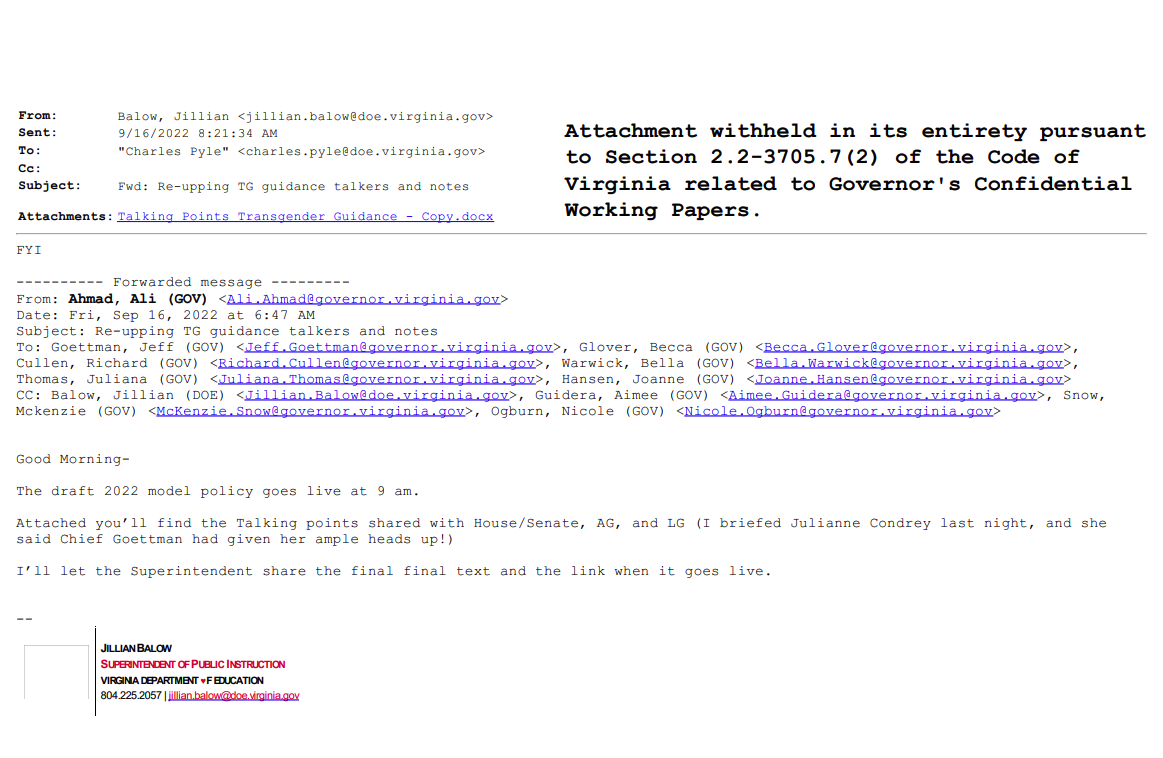Virginia public officials misuse ‘working papers’ exemption to shield records

Like every other state public records law, the Virginia Freedom of Information Act includes a wide range of exemptions that allow government agencies to withhold information from the public. Over the past year and a half, one of them has attracted outsized attention from attorneys at the Reporters Committee for Freedom of the Press: an exemption that shields the “working papers and correspondence” of certain public officials in the state.
The so-called “working papers” exemption allows the government to protect certain records prepared by or for the governor, mayors, and other high-ranking officials that guide their decision-making process, as long as they haven’t been given to outsiders. But there is growing concern that some public officials in Virginia are misusing the exemption to withhold records that fall outside of its narrow scope — and that courts aren’t stopping them from doing so.
As Reporters Committee Staff Attorney Gunita Singh recently told VPM News, it is one of the most notorious exemptions in the Virginia Freedom of Information Act.
It’s become “one of the broader executive privileges in the country,” Singh said. “And it’s unfortunate that courts and agencies don’t often honor the presumption in favor of disclosure.”
The Reporters Committee recently filed two separate friend-of-the-court briefs challenging government officials’ broad interpretation of the working papers exemption. In one case, Reporters Committee attorneys argue that the office of Gov. Glenn Youngkin cannot use the exemption to withhold records related to an email “tip line” the governor’s office implemented as part of its efforts to end the use of what it called “inherently divisive concepts” in state education. And in another case, Reporters Committee attorneys argue that the town of Warrenton, Virginia, should be forced to turn over more than 3,000 records related to a permit sought by Amazon to build a local data center.

These briefs follow two lawsuits Reporters Committee attorneys litigated on behalf of VPM News over the Virginia Department of Education’s use of the working papers exemption to shield records related to Critical Race Theory and policies concerning transgender students. In the Critical Race Theory case, the Virginia Department of Education disclosed the record at issue shortly after the lawsuit was filed. In the case related to transgender policy records, however, a court ruled in the government’s favor, finding that the records at issue were properly withheld.
Lin Weeks, a senior staff attorney at the Reporters Committee, has been involved in each of these cases. We recently spoke with him to learn more about the working papers exemption, how public officials are misusing it, and why the Reporters Committee is pushing back. (This interview has been edited for length and clarity.)
What is the purpose of the working papers exemption?
There’s very little legislative history in Virginia. Most probably, the purpose of the provision is to provide certain high-ranking executives some privacy over their decision-making prior to that decision being made. The idea being that if the public can see the decision-making process at every step along the way officials might not be able to be as candid and the quality of the decisions they reach might be affected.
Is this exemption similar to the “deliberative process” privilege in the federal Freedom of Information Act?
It’s written more narrowly. The deliberative process privilege in federal FOIA derives from a broader statutory privilege that exempts inter- and intra-agency documents that wouldn’t be available to a party in litigation. One key difference is that the federal FOIA deliberative process privilege isn’t constrained to certain executive officials like the VFOIA working papers exemption is. That said, there are some judicial constraints on the application of the federal FOIA deliberative process privilege that are instructive as courts in Virginia interpret the working papers exemption. For instance, in the federal FOIA context, courts have found that, in order for the deliberative process privilege to be applied by an agency, the records have to come before a decision is made, and they also have to be related to a decision being made by the agency.
How exactly is the exemption being misused by public officials in Virginia?
We’ve seen a number of journalists come to us with requests that have been denied under the working papers exemption, where it seems like the government is applying that exemption too broadly. In some cases, it seems to us that the records in question have been disseminated outside of the people or entities that would normally be protected by the working papers exemption in a way that makes those records no longer personal or deliberative, as required under the statute.
There’s also a question of exactly what constitutes “correspondence” under the statute. At the time the statute was written, correspondence probably referred mostly to letters. Obviously, with email and digital communications, it’s very easy to just copy someone on an email. And our stance has been that that shouldn’t be sufficient to bring the record under this exemption. It’s really meant for something that a high-ranking executive official is personally using in their deliberative process.
In other words, if there are communications between agency officials and they happen to copy the governor or a city mayor, that record should not qualify for protection under the working papers exemption?
Yeah, that’s right. It shouldn’t qualify unless it’s specifically directed to that person to guide their decision-making.
Why has the Reporters Committee been pushing back against the misuse of this exemption? What is the potential harm?
If the exemption is given too broad a construction, the result is going to be that a lot of government bodies, and state and local executives, are going to be insulated from the accountability that comes from the disclosure of public records. Transparency, especially in the executive branch, is very important because it allows the people of Virginia to know what their government is up to. For instance, if there is malfeasance or mismanagement in a mayor’s office, VFOIA should be a tool for the press and public to understand that malfeasance.
What are some of the arguments that you’re making in these lawsuits and friend-of-the-court briefs?
Just generally, I think one overarching argument we’ve made is that courts need to require the agencies to meet their statutory burden. Within VFOIA, there’s a requirement that if an agency wants to assert an exemption, it has to show by a preponderance of evidence that the exemption in question applies. So here the agency should be required to bring evidence to show that these are in fact working papers or correspondence and that if they are working papers or correspondence that they are made by or for one of the officials named in the statute and that they are for that person’s personal or deliberative use. So the courts need to require the agencies to actually meet that burden instead of letting agencies just assert, without proving, that these are working papers or correspondence and exempt.
I think the second piece that we’ve been looking at is that even if it’s a working paper or correspondence, if it’s been disseminated to outsiders — whether that’s outside the office of the governor or outside of government altogether — those records then lose their personal or deliberative nature and should no longer be protected by the exemption.
And then, finally, just a broader theme: VFOIA, like a lot of public records statutes, has a requirement that exemptions be interpreted narrowly. Given the trend that we think we’ve seen recently in the state, we think that it’s important that courts keep that in mind as they interpret the working papers exemption.
The Reporters Committee regularly files friend-of-the-court briefs and its attorneys represent journalists and news organizations pro bono in court cases that involve First Amendment freedoms, the newsgathering rights of journalists and access to public information. Stay up-to-date on our work by signing up for our monthly newsletter and following us on Twitter or Instagram.